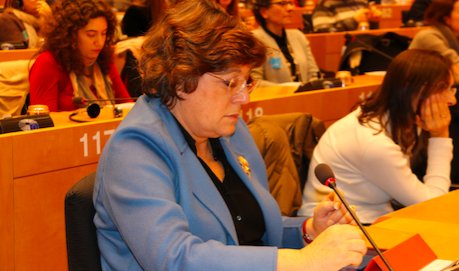08.09.2017 - 21:00
|
Actualització: 11.09.2017 - 21:01
Following the tense legal sparring of the last few days, some member of the European Parliament (MEPs) have offered their opinions on the actions of the Catalan and Spanish government following the referendum law being approved in Parliament, urging the right to decide to be respected.
The Scottish referendum as an example
Portuguese Socialist Party MEP Ana Gomes voiced her concerns, but she said that voting is the way forward. She explained that “big questions such as those that divide the people in Catalonia” should “be decided in a peaceful and democratic way” through this very mechanism. The Socialist MEP admitted that she disagrees with the way the referendum law was passed, taking issue with the decision in Parliament being “rushed.”
She explained that she wishes that the right to vote had been the “result of a democratic consultation between the authorities of Catalonia and the authorities in Spain.” “I have always pushed for this dialogue,” she noted, adding that she believes that there is a need to review “the conditions and the framework of the relationship between Catalonia, and the framework of Spain.” She added that she is worried because “any violence would be very negative for the EU.” Still, she said that a referendum should have been agreed upon, using the Scottish referendum as “the perfect example” of what she would like for Catalonia.
Allowing Catalans to express their will
German MEP Ska Keller, co-chair of the Greens parliamentary group, is also worried that the situation “is heading towards institutional confrontation.” Inasmuch, she advised the Catalan and Spanish governments to start negotiations “immediately.” According to Keller, negotiations must serve to establish a dialogue towards a referendum that’s agreed upon, “to allow Catalans to express their will.”
A measure of Catalonia’s democracy
Other MEPs have voiced their confidence that the referendum will take place on October 1, hoping that the Spanish government won’t stand in the way of the referendum organization. Flemish conservative reformist MEP Helga Stevens, for one, described the approval of the referendum law as “a positive step forward,” adding that it shows “how democratic Catalonia is.”
Stevens’ hoped for Spain’s reaction is that “they will allow the people of Catalonia to vote for their future positively or negatively.” When asked about the possibility that Madrid will block the referendum, the MEP further voiced her wishes that both Madrid and Barcelona “will return to the negotiation table and not fight this issue in court.” She added that, in her opinion, “political problems must be solved in Parliament through negotiations.”
The only entity in the world that can decide
Meanwhile, Portuguese liberal MEP António Marinho said “the only entity in the world that has the right to decide whether Catalonia must be independent or not is the people of Catalonia.” Marinho believes that the courts should not intervene in the future referendum, adding that, currently, “they are giving a very bad example of justice to the world.” What’s more, he found it surprising that “a small group of people named by PP or PSOE politicians can decide against the will of the parliaments freely chosen by the people.”
Predicated on the basis of inclusion and respect
Irish MEP Martina Anderson, from the European United Left/Nordic Green Left group (GUE / NGL) also thinks that the Catalans should have the right to choose their own government, describing it as a “fundamental right to self-determination.” Anderson believes the referendum will be held, describing it as “peaceful” and “predicated on the basis of inclusion and respect.”
She then said that this is why it “should be respected by the Spanish government” with the right to self-determination “played out in front of the world without external interference from anyone,” noting that this includes both the EU and the Spanish government. Still, she explained that there is “no doubt that the Spanish government should allow this referendum.”



